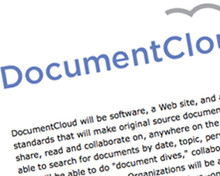
Two of the project's proposers, Eric Umansky, senior editor at ProPublica and Aron Pilhofer, the New York Times newsroom interactive technologies editor, found time to tell Jounalism.co.uk what it is - and isn't - about.
First up, while backed by the New York Times and ProPublica - among others - it's an independent organisation, they say, which eventually could have global reach.
It is software, a website and a set of open standards 'that will make original source documents easy to find, share, read and collaborate on, anywhere on the web', the first version of its site states.
Pilhofer will put in time and leadership, he says, but in an independent capacity. "It's more than a hobby, but less than a job," Umansky adds. That means they will be employing full-time staff, starting with a developer.
"We are definitely hiring a lead developer and possibly an executive director down the road. It very much depends on how we decide to structure 'DocumentCloud the organisation'," says Pilhofer.
A site is up-and-running but it's still at a very preliminary stage, they both stress. The Knight News Challenge funding, $719,500, will set them up for the next two years, says Umansky. The immediate focus will be putting out the best software they can.
It's not a collection of documents; rather software to support documents hosted elsewhere, the pair explain.
"What we're primarily about is building making documents more findable and useable. One of the things we're doing now is reaching out to news outlets," says Umansky.
"The response we've gotten after the announcement is really encouraging. A number of other media organisations have already asked us how they can participate, which is exciting," adds Pilhofer.
Organisations will keep documents and readers on their own sites. "We're not trying to go against the grain of people's self-interest: people can keep documents on their own sites," Umansky further explains. The site itself puts it like this: "Think of it as a card catalogue for primary source documents."
The idea is that users will highlight key passages and link to various documents, so that connections are made.
"Users will be able to search for documents by date, topic, person and location, and will be able to do 'document dives,' collaboratively examining large sets of documents," the site states.
"I am thrilled that the Knight Foundation thought so highly of this project, which does not, you know, lend itself to a quick or easy explanation," says Pilhofer.
"I would love to see this vision we all have simply come to be. That's number one. Second, I would love to see journalists, bloggers, citizen journalists, bloggers breaking stories based on information they unearthed via DocumentCloud, stories that would have been hard or impossible to get any other way.
"This entire project is going to be based on software we develop and open source, open standards and open APIs. DocumentCloud is as much a platform as it is anything else, and I could envision it becoming raw material for lots of creative developers to build on."
Free daily newsletter
If you like our news and feature articles, you can sign up to receive our free daily (Mon-Fri) email newsletter (mobile friendly).
Related articles
- News subscriptions hit a snag amid cost-of-living crisis, RISJ report finds
- Average revenues up by 20 per cent for UK independent news publishers
- Avery Anapol, commissioning editor at The Conversation, on engaging younger audiences with academic content
- Information literacy courses can help students tackle confirmation bias and misinformation
- You have half a minute to win over your reader - use it smartly









